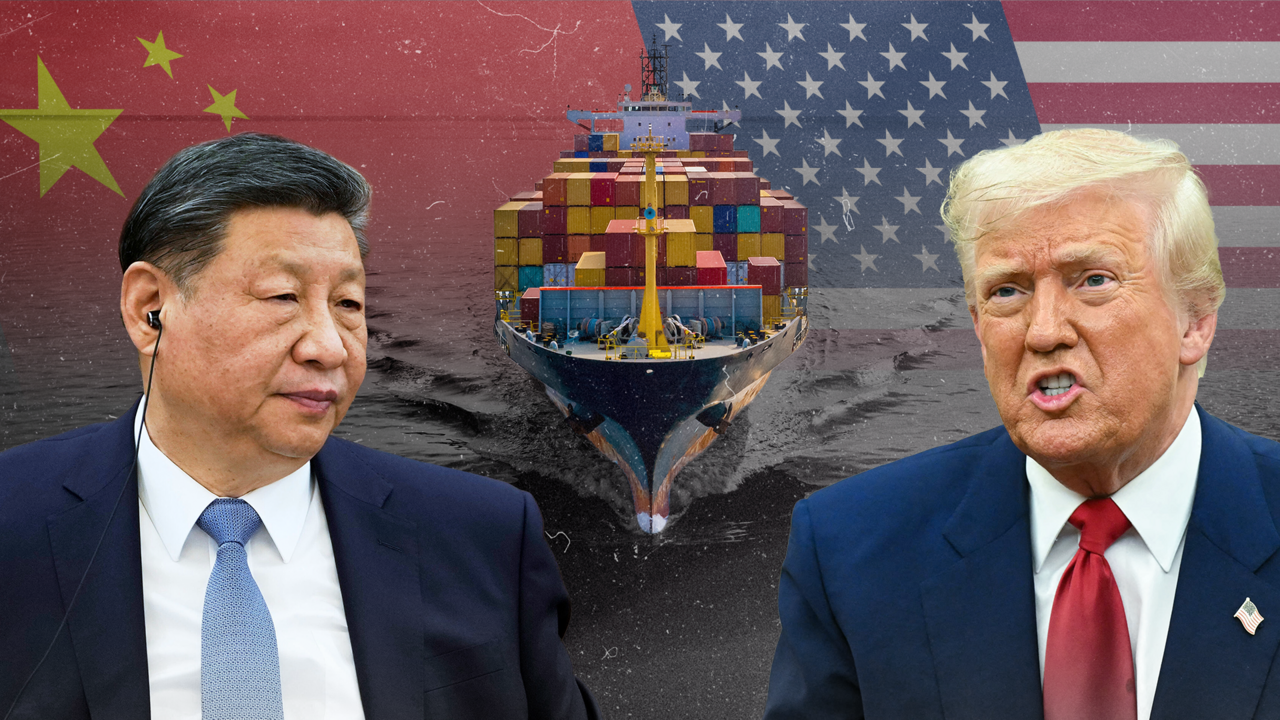As headlines spread and stock markets plunged, everyday Malaysians voiced their concerns online. Using DXT360, Dataxet Malaysia tracked the public’s response, providing an in-depth view into how global developments reverberated at the local level.
The recent tariff announcement by US President Donald Trump has sent shockwaves throughout the global economy. The introduction of reciprocal tariffs on Chinese imports has sparked a trade war, with China and other countries retaliating with their own tariff policies on US imports. The Trump administration has imposed tariffs on a wide range of products, including electronics, pharmaceuticals, smartphones, and semiconductors, in an effort to protect American industries, enforce WTO rules, and promote economic growth. However, the move has been met with criticism from trading partners, Chinese officials, and global leaders who warn that it could destabilize the global trading system.
From public discourse on U.S. reciprocal tariffs to local political scrutiny with the Ismail Sabri MACC probe, our coverage spans both international and domestic issues. Visit our news section for more insights and articles.
Impact on Global Economy
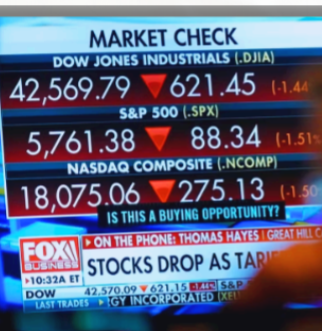
The impact of the tariff announcement on the global economy has been significant. The imposition of reciprocal tariffs has led to a decline in trade between the US and China, with both countries experiencing a slowdown in economic growth. The trade war has also had a ripple effect on other members of the global trade community. Countries such as the European Union, South Korea, Canada, and ASEAN nations have seen increased economic pressure, retaliatory measures, and disruptions to the flow of exports and imported goods. The global trading system is at risk of breakdown, with many experts suggesting that current tariff rates and trade barriers could completely cancel decades of progress in free trade.
 
Timeline of Public Reactions
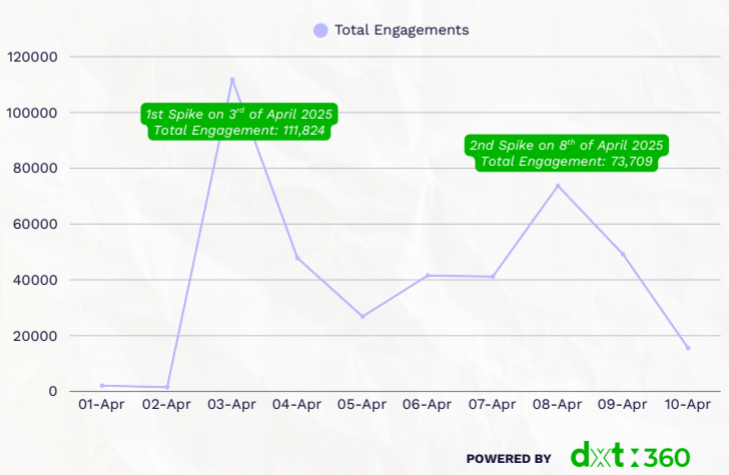
2 April: Trump Announces Tariffs
The White House revealed new tariff policies targeting Chinese imports, citing national security and WTO rules. Although Chinese officials initially downplayed the move, the executive order raised immediate concerns about goods exempted and the future of US imports. Malaysian netizens expressed worry about the higher tariffs on goods manufactured abroad and the effects on the local economy.
3 April: First Engagement Spike
Online engagements surged to 111,824 interactions as the public responded to rising concerns over the cost of living, global instability, and imported goods like iPhones
7 April: Stock Market Crash
Major indices in the US plummeted, adding to public fears about financial instability and ripple effects in Malaysia.
8 April: Second Engagement Peak
After President Trump warned of a 50% tariff on Chinese products, interactions surged again. Discussions highlighted tariff exemptions, retaliatory measures by other countries, and questions about whether the government would secure exemptions for Malaysia.
 
Where Did the Conversation Happen?
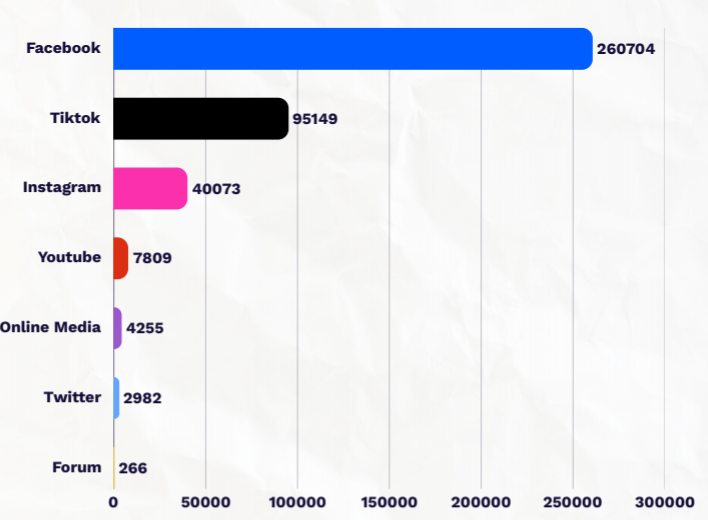
The discussion unfolded across a range of digital platforms:
Facebook: 260,704 engagements
TikTok: 95,149 engagements
Instagram: 40,073 engagements
YouTube: 7,809 engagements
Twitter: 2,982 engagements
Forums: 266 engagements
Facebook drew the most attention, with politically and economically engaged users sharing detailed criticisms. State media, online business communities, and influencers helped amplify the conversation. Platforms like TikTok and Instagram showcased how younger demographics responded to the impact of tariffs on electronic products and lifestyle goods.
 
Word Cloud Analysis: Dominant Themes in Public Discourse 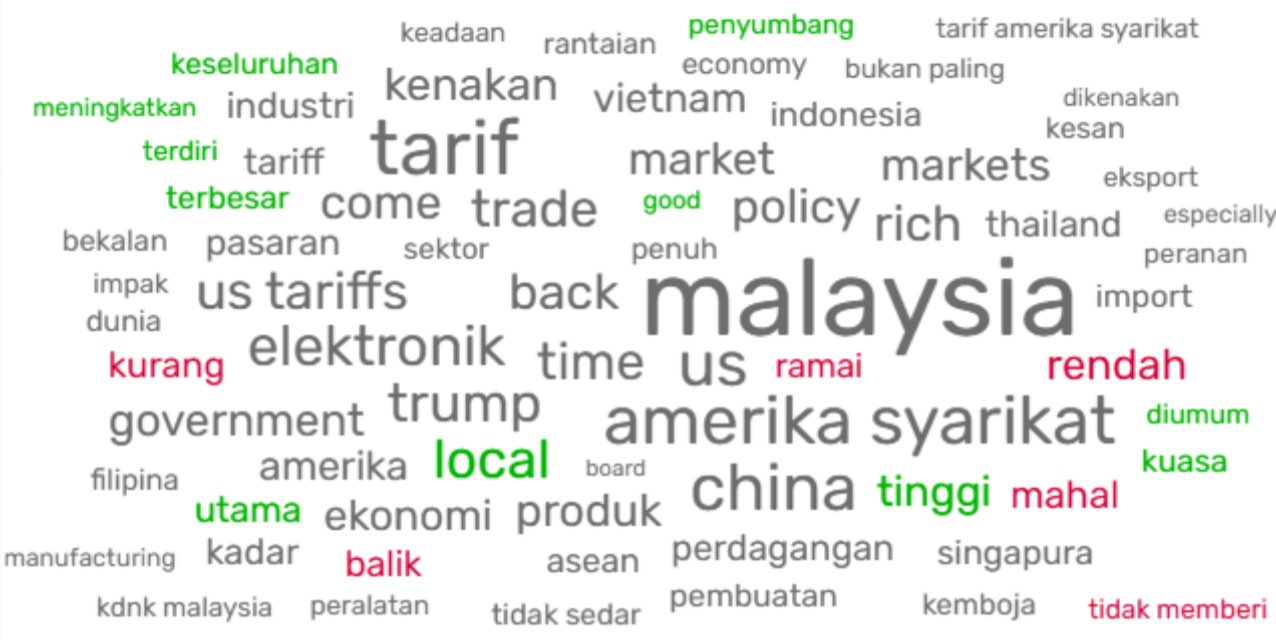
The word cloud visualisation highlighted the recurring concerns expressed by netizens.
These reflected the following key themes:
1. Supply Chain Vulnerabilities
Terms like “bekalan”, “rantai”, and “peralatan” indicated fears over Malaysia’s dependency on foreign manufacturing. The electronics supply chain, heavily reliant on Chinese goods and US imports, has been destabilized by Trump’s levies.
2. Electronics Sector and Pricing Pressures
Mentions of “elektronik”, “produk”, “mahal”, and “tech giants” pointed to concern over rising prices for smartphones, electronics, and other imported goods.
3. Inflation and Economic Impact
Words like “ekonomi”, “kesan”, and “kuasa” pointed to deeper anxieties regarding inflation and the broader economic fallout.
4. ASEAN Cooperation
Frequent mentions of ASEAN member states such as “Singapura”, “Vietnam”, and “Kamboja” indicated discussions around regional collaboration, though opinions were divided on the bloc’s ability to act effectively.
 
Social Sentiment Breakdown
Sentiment analysis revealed the emotional landscape of Malaysian responses:
65% Negative – driven by fear, frustration, and sarcastic remarks about the state of the economy and governance.
30% Neutral – factual commentary and trade observations.
5% Positive – expressions of hope for regional cooperation and new economic strategies
.

The tone ranged from exasperation to sharp humour:
“Tariffs there, inflation here — and we’re just expected to survive on vibes?”
“Gaji tak naik, barang semua naik!”
“You think iPhones are expensive now? Wait until they’re priced like gold bars.”
“Malaysia’s foreign policy = smile, nod, and hope price doesn’t naik.”
“Ah yes, international drama. As always, Malaysia pays the bill.”
“Time to switch from iPhone to ‘Ayam-phone’. RM10 je.”
Key Topics That Drove the Conversation
Rising Costs & Inflation (35%)
Tariffs on tech products, pharmaceuticals, and imported goods have led to significant price hikes. While some exemptions were issued, they were seen as a small step with limited effect.
US–China Trade War: Who Will Win? (30%)
Netizens debated who would benefit or suffer more. Chinese products and American imports became central to the discourse.
Malaysia’s Stance (15%)
Some questioned whether Malaysia had a clear foreign policy direction, while others criticised the government for perceived passivity.
Teaming Up Against the US? (10%)
A section of the public floated the idea of ASEAN aligning more closely with China, inspired by the European Union’s model of cooperation.
iPhones Getting Pricier? (10%)
iPhones, laptops, and other tech products were seen as “held hostage” by tariff battles.
 
Brands That Came Under the Spotlight
Apple led by a wide margin, appearing in 61% of brand-related mentions. The public was largely concerned about iPhone affordability, supply disruptions, and price hikes. Other brands mentioned included:
Tesla (11%)
Ford (11%)
Xiaomi (4%)
Proton (4%)
Perodua (2%)
Key Sectors Affected by Trump’s Tariffs

The tariff news didn’t affect all industries equally. These sectors received the most mentions:
Technology (47%) – Discussion about semiconductors and consumer electronics.
Finance (29%) – Discussion focused on the crashing stock market and fears of economic instability.
Retail (12%) – Discussion regarding the call for a boycott of American brands such as McDonald’s and Starbucks, alongside debates about affordability.
Automotive (6%) – Discussion about Tesla and EVs, as well as local car brands such as Proton
Manufacturing (6%) – Discussion about job losses and rising costs for locally assembled goods.
 
Key Takeaways & Implications
- Inflation fears remained the public’s biggest concern.
- Distrust in leadership was evident, particularly in handling global disruptions.
- Brand loyalty shifted, especially for American tech and consumer brands.
- Social media sentiment highlights distrust in global trade leadership and demand for stronger regional cooperation.
- The role of the World Trade Organization and future global trade rules remains uncertain as new tariff rates reshape the economic landscape.


Follow Us On 
Follow Us On

